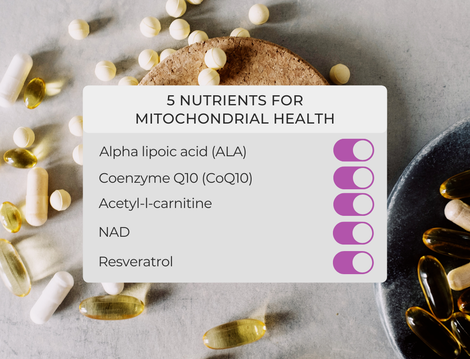|
Why you should care about your mitochondria! Unexplained exhaustion? Energy lulls? General fatigue? Don’t get me wrong—there can be a lot of different underlying reasons for low energy, but one thing we always consider is mitochondrial health. Lots of doctors only mention the mitochondria in relation to inherited mitochondrial disorders. These are rare and not what I am referring to at all. From a functional medicine perspective, we often see that suboptimal function can create issues, even in the absence of any diagnosable disease. Your mitochondria are tiny organelles inside your cells that are responsible for producing energy. We often call them the “powerhouse” of the cell. Some types of cells contain more mitochondria than others—like liver cells and muscle cells. Mitochondria are also highly concentrated in heart muscle because of the high demand for energy there. The health and function of your mitochondria can influence almost everything about your health, including: ➡️ Energy levels ➡️ Heart health ➡️ Cholesterol ➡️ Muscle recovery ➡️ Metabolism ➡️ Brain health ➡️ Aging ➡️ and more! Regardless of whether you have any specific health concerns, supporting mitochondrial function gives your body the advantage of achieving optimal function, healthy aging, and more. Threats to Mitochondrial Health Feeling your best and optimizing your health begins at the cellular level, or even at the subcellular level—like in the mitochondria! Our mitochondria create almost all of our cellular energy, so if they are compromised then so are we. Even though our mitochondria can work tirelessly without notice to keep us feeling energetic and healthy, it’s important to know that they are susceptible to damage. If you want to maintain healthy mitochondrial function, you’ll want to minimize your exposure to these potential threats: ➡️ Cigarette smoke ➡️ Heavy metals (like mercury) ➡️ Environmental chemicals ➡️ Radiation ➡️ Some medications (like fluoroquinolones) ➡️ Some pesticides To sum up this list, pretty much anything that creates free radicals and oxidative stress can potentially damage mitochondria. Part of the reason for that is because mitochondrial DNA is packaged differently than nuclear DNA and is therefore more fragile and less protected. We also know there is a natural decline in mitochondrial synthesis and efficiency with age. That doesn’t mean you should stop aging! It means you should be even more proactive to support mitochondrial health as you get older. 5 Nutrients for Mitochondrial Health Optimizing your mitochondrial function means you are giving your body the advantage of efficient energy production. That means potential benefits for your brain, heart, muscles, and more. Here are some top supplements known to support mitochondrial health. 1️⃣ Alpha lipoic acid (ALA). ALA is a powerful antioxidant and a cofactor for many enzymes that are active in the mitochondria, helping to optimize cellular energy production. 2️⃣ Coenzyme Q10 (CoQ10). CoQ10 is critical in the final step of energy production in the mitochondria. With so many mitochondria concentrated in the heart muscle, this nutrient is also extremely important for heart health. 3️⃣ Acetyl-l-carnitine. Acetyl-l-carnitine plays an important role in fatty acid metabolism inside the mitochondria. It has shown in studies to support mitochondrial synthesis and energy production. 4️⃣ NAD. NAD stands for nicotinomide adening dinucleotide. It plays a critical role in energy production in the mitochondria. Supplements that can be taken orally to support NAD+ levels include nicotinamide riboside and nicotinomide mononucleotide (NMN) 5️⃣ Resveratrol. Resveratrol is an antioxidant that is concentrated in red wine and purple grapes. By supporting antioxidant defenses, it helps to minimize the damaging effects of free radicals on the mitochondria. 5 Habits for Mitochondrial Health Looking for simple habits you can practice every day to support mitochondrial synthesis and efficiency? Here are 5 science-backed ways. 1️⃣ Eat the Rainbow. Colorful foods are rich in plant nutrients called polyphenols. These are powerful antioxidants, combatting free radicals that could pose a threat to mitochondrial health. Great foods to try? Pomegranates, blueberries, purple cabbage, and green tea! 2️⃣ Intermittent Fasting. Intermittent fasting means eating only during restricted windows of time. Examples include fasting for at least 12 hours overnight, alternate-day fasting, or the 5-2 diet. Studies show that fasting triggers the production of various mediators that support the synthesis and function of mitochondria. 3️⃣ End Shower on Cold. Exposure to cold triggers a series of events in the body that support mitochondrial synthesis. While you can go to the extreme of cold plunges or ice baths, a simpler hack is to end your showers with 30-60 seconds of cold. 4️⃣ High-Intensity Interval Training (HIIT). Any form of exercise is good for your mitochondria, but the best research is on HIIT. HIIT means exercising at high intensity (until out of breath) for brief bursts, alternating with lower intensity to recover. For example, you might sprint for one minute and then walk for 3 and repeat. One study found that 12 weeks of HIIT supported muscle mitochondrial number and function. 5️⃣ Prioritize Sleep. Sleep is a restful time for your body to take care of housekeeping tasks that clear toxins, recover, and rebuild. Adequate sleep is essential for healthy mitochondrial function. This is not an exhaustive list of all the ways to support mitochondrial function, but it does give you some of the simplest things you can do every day at home. Remember—your mitochondria are critical for energy production in every cell of your body and can influence almost every aspect of your health. |
About Our Blog:Author: Categories:
All
Archives:
November 2022
|
|
Shop Hours:
M - Th: 10-5:30pm, Fri 10-2pm |
Stay Connected with Us!
|


 RSS Feed
RSS Feed


